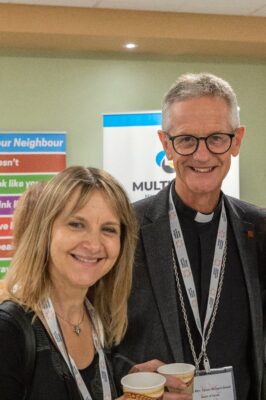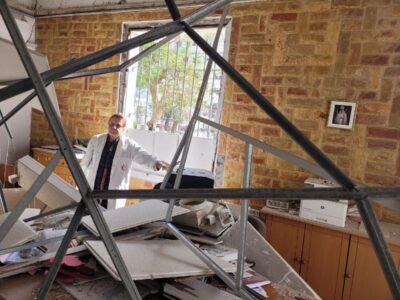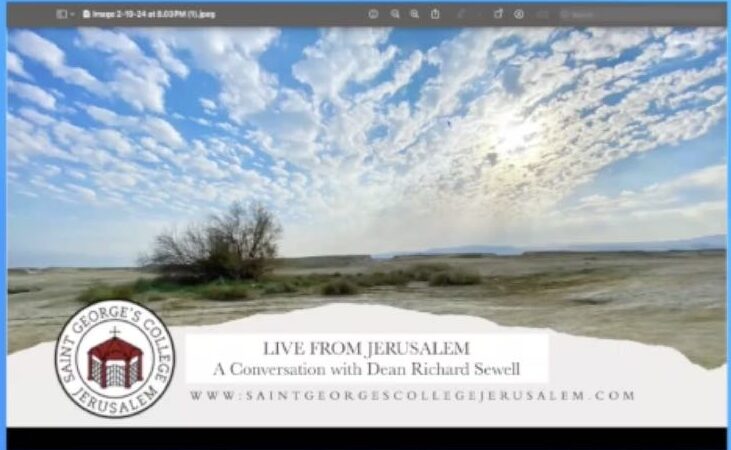As news of the war in Israel and Palestine and humanitarian disaster in Gaza worsens daily, Bishop Shane Parker shared and commended a recent video conversation with the Very Rev. Richard Sewell, the Dean of St. George’s College in Jerusalem, which provides an update on Anglican ministries in the region and his compassionate Christian perspective on the conflict. Dean Sewell visited the Anglican Diocese of Ottawa as the guest speaker at the 2023 Synod in October.

In the video conversation with the Rev. Barkley Thompson, president of the North American Committee for St. George’s College, Dean Sewell spoke of the suffering the war has caused for all people of all faiths in the land, with a particular focus on the humanitarian crisis in Gaza.
“We have an enduring situation where every day, hundreds of people are dying in Gaza with a massive military attack on 2.2 million people in Gaza who have nowhere to escape to, they have nowhere to hide, and they are completely vulnerable…. The vast majority of people who are dying are Palestinian civilians. And on top of that, there is very little aid getting in. Almost all of the hospitals now are completely inoperative, so people who get severe injuries are unable to get the sort of medical care that they need. And people are starving. And that is really biting hard now. And there has been a lack of water as well.”
He explained that the situation is the result of “a combination of Israel’s determination not to allow aid and necessary supplies in because they don’t want it getting in the hands of Hamas, and also because there is a significant demonstration by Israelis at the gate going into Gaza of people preventing aid going in.”
Asked about the state of the Al-Ahli Hospital in Gaza City that is run by the Episcopal Diocese of Jerusalem, Sewell was able to report a bit of good news that it is “miraculously” still able to function. “Our Al-Ahli hospital is one of the very few shining lights in the whole of this situation. The initial missile attacks on Oct. 17 were the last significant damage that we had done, although we were sieged for three days, but we never stopped operating even under that siege.

“Al Ali Hospital is not a general hospital, it was never intended to be a general hospital, it does not have the facilities for dealing with the sorts of catastrophic injuries that people have, but that is what it is doing,” he explained. “It is operating within the buildings which are mostly still okay, and they are finding a way of treating the many, many injured and sick, increasingly those with diseases caused by hunger, malnutrition.” Sewell asked listeners to pray “first and foremost for the staff of that hospital and all other medical staff working through Gaza who are working in intolerable, unbearable conditions relentlessly with no escape. And they are doing their extraordinary work, mostly Muslims with a few Christians together. Many people still are sheltering in the grounds of Al-Ali hospital so it is somewhere between a refugee camp and a hospital.”
A ceasefire is essential, he said. “Everybody in this land, Jewish, Israeli, Palestinian, Israeli, Palestinians in Gaza and in the West Bank, everybody in Jerusalem, all over this land, everybody is angry and everybody is afraid about the future. and simply comparing and contrasting and competing for who has the highest cause to do what they are doing is futile…. All conflicts eventually come to an end by sitting down and working out the terms of the ceasefire and that is what has to happen,” he added.
When asked what Christians around the world could do to help, Dean Sewell thanked everyone for their prayers. He also offered these suggestions for other ways to help:
- “Please pepper your political representatives with letters calling for a ceasefire. …Nobody can make the ceasefire happen except the warring parties, but… by writing, … that’s helping them to see that’s what people are wanting. It’s not the end game but nothing good will happen until there is a ceasefire.”
- “If you know ways of buying goods from Palestinians in the West Bank, in Jerusalem, and we can supply details of two or three personal friends of ours who have an online presence, you can buy goods from them. This will keep them and their families alive and with food on the table.”
- “Strengthen your links. If you have any personal links with people in Israel and Palestine, just send them an email…convey some care and concern, and ask how we are and how we’re coping. Just be in touch.”
- “Please develop and strengthen links with Palestinian and Israeli organizations who work for a better land here and work to bridge gaps. And there are many fantastic ones, certain ones that we closely associate with, like Musalaha and Kids 4 Peace…Jerusalem Peace Builders.
- “And please don’t look away from this situation. I know it is relentless, I know it is sometimes overwhelming, and you don’t have to live and breathe at every moment of the day like I do, but simply turning off and saying, ‘No, I can’t cope with any of that anymore, I can’t do it.’ That really does leave us bereft. So stay in touch with the news, with the developments, in the way that is manageable for you. But please don’t just look away from us.”
- “And finally, I’d say, ….do not let your language become infected by the language of hatred and division, where you demean and diminish the pain of the other side as if it were nothing. If we do not engage in what I’m calling a radical empathy, which reaches beyond those that we naturally feel an affinity to, we will be perpetuating this same awful conflict in our own communities. So finding words that bridge are important.”


Week of Prayer for Christian Unity annual service to be celebrated at Saint Paul University on Jan. 22